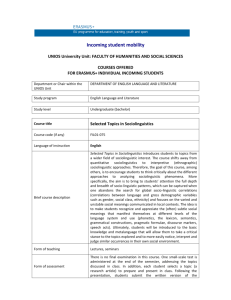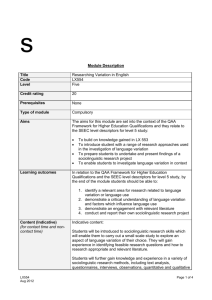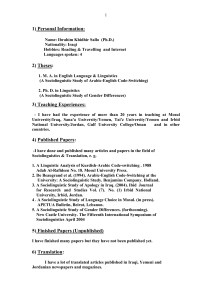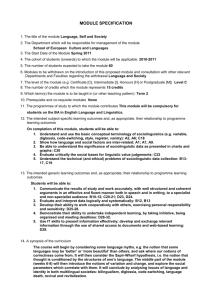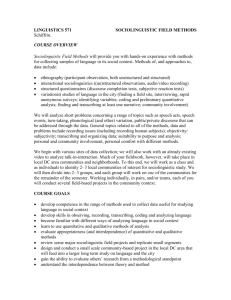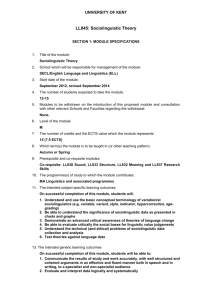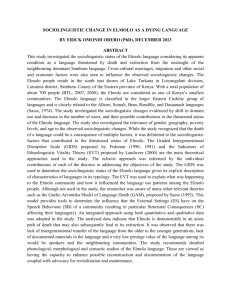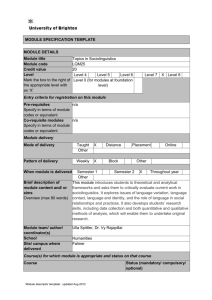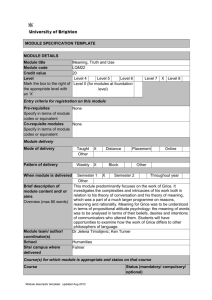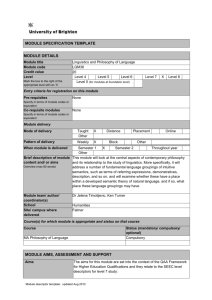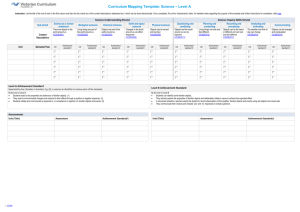Kiesling, SF (2011) Linguistic Variation and
advertisement
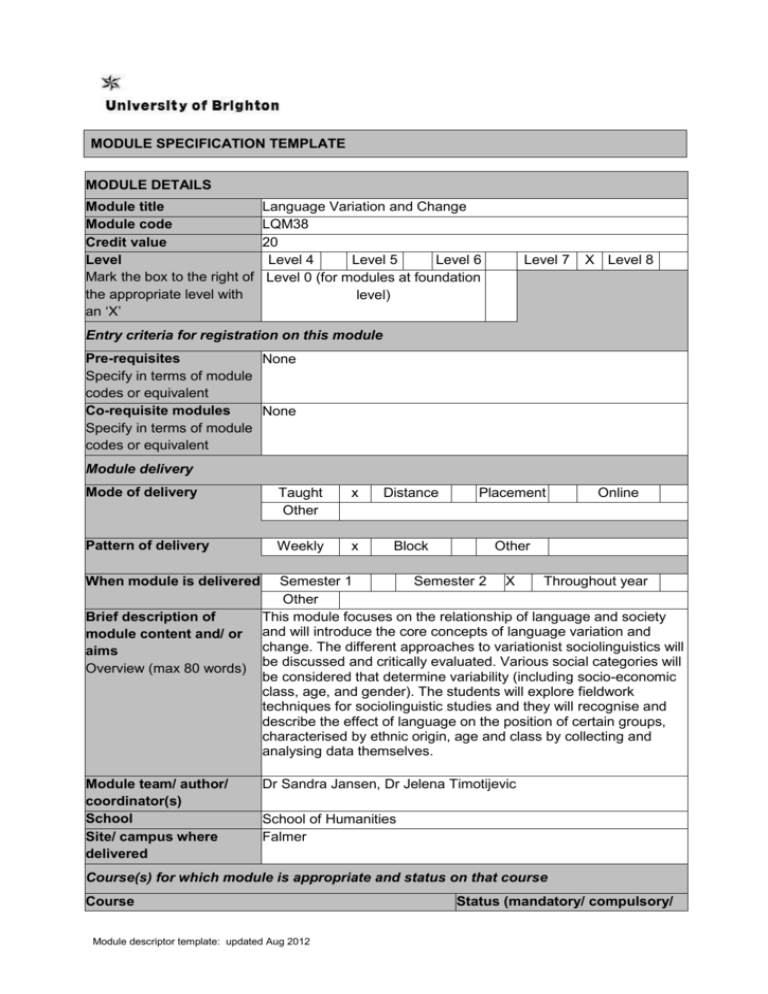
MODULE SPECIFICATION TEMPLATE MODULE DETAILS Module title Module code Credit value Level Mark the box to the right of the appropriate level with an ‘X’ Language Variation and Change LQM38 20 Level 4 Level 5 Level 6 Level 0 (for modules at foundation level) Level 7 X Level 8 Entry criteria for registration on this module Pre-requisites None Specify in terms of module codes or equivalent Co-requisite modules None Specify in terms of module codes or equivalent Module delivery Mode of delivery Taught Other x Distance Placement Pattern of delivery Weekly x Block Other When module is delivered Brief description of module content and/ or aims Overview (max 80 words) Module team/ author/ coordinator(s) School Site/ campus where delivered Online Semester 1 Semester 2 X Throughout year Other This module focuses on the relationship of language and society and will introduce the core concepts of language variation and change. The different approaches to variationist sociolinguistics will be discussed and critically evaluated. Various social categories will be considered that determine variability (including socio-economic class, age, and gender). The students will explore fieldwork techniques for sociolinguistic studies and they will recognise and describe the effect of language on the position of certain groups, characterised by ethnic origin, age and class by collecting and analysing data themselves. Dr Sandra Jansen, Dr Jelena Timotijevic School of Humanities Falmer Course(s) for which module is appropriate and status on that course Course Module descriptor template: updated Aug 2012 Status (mandatory/ compulsory/ optional) Optional Optional Optional MA English Language MA Linguistics MA Philosophy of Language MODULE AIMS, ASSESSMENT AND SUPPORT Aims The aims for this module are set into the context of the QAA Framework for Higher Education Qualifications and they relate to the SEEC level descriptors for level M study. The module aims to offer participants opportunities to: Learning outcomes Explore the relationship between language and society Become familiar with the nature and mechanisms of linguistic change within a community Enable students to revisit their preconception of language use and language change in varieties of English in the British Isles Enable the students to describe and analyse collected language data Investigate different data collection methods Provide students with analytic and discursive skills In relation to the QAA Framework for Higher Education Qualifications and the SEEC level descriptors for level M study, by the end of the module students should be able to: 1. Demonstrate an in-depth knowledge and understanding of the core sociolinguistic theories in the approaches to analysing language variation and change 2. Demonstrate an ability to assess and apply appropriate theoretical approach(es) to an examination of data analysis 3. Demonstrate an ability to apply an appropriate research method(s) when analysing data 4. Demonstrate a critical understanding of the key issues relating to sociolinguistic data. 5. Demonstrate an ability to design and conduct a small research project in the Language Variation and Change paradigm Content In this module students will learn about the language variation and change approach to sociolinguistics. They will discuss the three waves of variation study. They will become familiar with sociolinguistic methodology and apply it in their own small-scale sociolinguistic project. Learning support Eckert, P. (2000) Linguistic variation as social practice. Oxford: Blackwell. Gordon, M. J. (2012) Labov: A Guide for the Perplexed. London: Continuum. Holmes, J. and K. Hazen (eds). (2014) Research Methods in Sociolinguistics. Malden and Oxford: Wiley Blackwell. Module descriptor template: updated Aug 2012 Kiesling, S. F. (2011) Linguistic Variation and Change. Edinburgh: Edinburgh University Press. Labov, W. (1966/2006) The Social Stratification of English in New York City. Washington, D.C.: Center for Applied Linguistics. Second edition: Cambridge: CUP. Mallinson, C., B. Childs and G. van Herk (eds). (2013) Data Collection in Sociolinguistics. Methods and Applications. New York and London: Routledge. Milroy, L. (1987) Language and social networks. 2nd edn. Oxford: Blackwell. Schilling, N. (2013.) Sociolinguistic Fieldwork. Cambridge: CUP. Teaching and learning activities Details of teaching and learning activities Weekly seminars and appropriate tutorial support when designing a small-scale research project. Some fieldwork may be required. Allocation of study hours (indicative) Where 10 credits = 100 learning hours Study hours SCHEDULED This is an indication of the number of hours students can expect to spend in scheduled teaching activities including lectures, seminars, tutorials, project supervision, demonstrations, practical classes and workshops, supervised time in workshops/ studios, fieldwork, external visits, and work-based learning. 20 GUIDED INDEPENDENT STUDY All students are expected to undertake guided independent study which includes wider reading/ practice, follow-up work, the completion of assessment tasks, and revisions. 80 PLACEMENT The placement is a specific type of learning away from the University that is not work-based learning or a year abroad. TOTAL STUDY HOURS 200 Assessment tasks Details of assessment for this module Assessment will be in the context of the University of Brighton Assessment Policy and the Faculty Code of Practice in Assessment, and students will be required to complete the following tasks: Task 1: Students submit a portfolio of work (a project), which will consist of three components (a presentation of a research article, a Module descriptor template: updated Aug 2012 project proposal and a small scale research project). Students will be awarded one mark for the portfolio of 100%. The task will be marked on a percentage basis. Module pass mark is 50%. Referral task: Reworking of original task General criteria for assessment are framed by the SEEC descriptors for level 7. Against specific criteria, credit will be awarded for: 1. In-depth knowledge and understanding of the core sociolinguistic theories in the approaches to analysing language variation and change (LO1) 2. Ability to asses and apply appropriate theoretical approach(es) to an examination of data analysis (LO2) 3. Ability to apply an appropriate research method(s) when analysing data (LO3) 4. A demonstration of a critical understanding of the key issues relating to sociolinguistic data (LO4) 5. Ability to design and conduct a small research project in the Language Variation and Change paradigm (LO5) Types of assessment task1 Indicative list of summative assessment tasks which lead to the award of credit or which are required for progression. WRITTEN Written exam COURSEWORK Written assignment/ essay, report, dissertation, portfolio, project output, set exercise PRACTICAL Oral assessment and presentation, practical skills assessment, set exercise % weighting (or indicate if component is pass/fail) 100% EXAMINATION INFORMATION Area examination board PG Programme in Linguistics and English language Refer to Faculty Office for guidance in completing the following sections External examiners 1 Set exercises, which assess the application of knowledge or analytical, problem-solving or evaluative skills, are included under the type of assessment most appropriate to the particular task. Module descriptor template: updated Aug 2012 Name Position and institution Date appointed Date tenure ends Prof. Daniel Kadar Professor of Linguistics and English language, University of Huddersfield 1st Jan. 2015 31st Dec. 2019 QUALITY ASSURANCE Date of first approval Only complete where this is not the first version n/a Date of last revision Only complete where this is not the first version n/a Date of approval for this version Version number 1 Modules replaced n/a Specify codes of modules for which this is a replacement Available as free-standing module? Module descriptor template: updated Aug 2012 Yes X No
